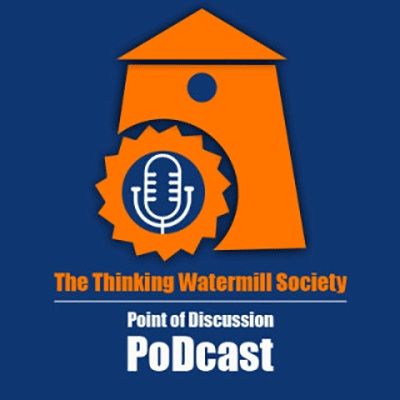The Parioli English School - World Bee Day Audio 4 students

Scarica e ascolta ovunque
Scarica i tuoi episodi preferiti e goditi l'ascolto, ovunque tu sia! Iscriviti o accedi ora per ascoltare offline.
Descrizione
WORLD BEE DAY ELENA D’ANTONIO Hello everyone. My name is Elena. Today we are celebrating World Bee Day so I would like to share with you the importance of raising...
mostra di piùELENA D’ANTONIO
Hello everyone. My name is Elena. Today we are celebrating World Bee Day so I would like to share with you the importance of raising awareness of bees protection as well as the United Nations Sustainable Development Goals programme which also gives relevance to these pollinators.
But before anything else, I must thank the Thinking Watermill Society for inviting the Parioli English School to the podcast. We are 4 students who deeply believe in “Bee Engaged” so that we can all contribute to safeguarding the most popular pollinators of our Planet.
Why should we care about pollinators?
There are different pollinators species in the world such as butterflies, birds and bats! No doubt, the bees are the most well-known ones ranging between 25.000 and 30.000 species.
Nearly 90 per cent of all wild flowering plants depend at least to some extend on animal pollination. These little animals allow many plants, including food crops, to reproduce. Indeed, the food that we eat such as fruits and vegetables, directly relies on pollinators.
A world without them would equal a world without bio and food diversity. The vast majority of flowering plant species only produce seeds if animal pollinators move pollen from the anthers to the stigmas of their flowers. Without this service, many interconnected species and processes functioning within the ecosystem would collapse. Therefore, pollination is a keystone process in the wild flowering.
Now I would like to introduce Isabella who will provide further information in this regard.
ISABELLA LO GUZZO
Hello, I am Isabella.
As a matter of fact, we all depend on nature.
For this reason, it would be really impactful for the world population to preserve not only the bees, but all pollinators.
Not only do pollinators contribute directly to the reproduction of plants in nature (as Elena told us), but they also help increase the amount of land exploitable for agriculture, affecting 35 percent of global land. These little insects strongly favour to fertilize our cultivated soil with their tiny legs.
Needless to say, during the last years their natural habitat has drastically changed and has severely been damaged.
In fact, what is causing bees extinction is the decreasing of blooming soil due to chemical products used for fertilising land, as well as treating the soil with new machines and techniques, which allows farmers reuse the land right after the harvest, but in the long run, leads to impoverishment of its nutriments. In addition, heavy machines easily destroy insects homes built on the ground between the grass blades, leading to the destruction of many pollinators’ natural environment and no place for these little animals to settle. Life on Land, which represents the 15th United Nations Sustainable Development Goal addresses this global challenge.
Now I would like to introduce Lorenzo to you.
LORENZO NANNIPIERI
Hello, I am Lorenzo.
Another important point, when it comes to the protection of pollinators, is clearly the role they play against world hunger.
The second sustainable development goal of the United Nations is called ‘Zero hunger’ and refers to the necessity to reduce the famine concern the world is currently facing: there are at least 50 countries in the world with almost 200 million people affected by this plague and sadly, these figures are likely to increase if no immediate action is taken.
Although pollinators cannot help to entirely solve this urgent and enormous catastrophe, their survival can impact positively as 80% of human food is supplied by plants which depend on pollinators.
According to the Food and Agriculture Organisation of the United Nations, the decline of bees populations, caused by pollution and climate change, is an alarming fact that could compromise the global food security and nutrition.
Without bees, several varieties of plants are endangered and, consequently, livelihoods and humans are no longer safeguarded.
Again, if this tragic trend continues, a large variety of crops such as fruits, nuts and a relevant portion of common vegetables will be replaced by staple crops, resulting in an unbalanced diet.
We can actually say that pollinators are crucial protagonists in the food chain, contributing to a well-balanced diet and, simultaneously, helping plants, animals and also humans be provided with fundamental substances for their lives.
Now Daniele is going to put forward another consideration in favour of pollinators.
DANIELE REDIVO
Hi, I'm Daniele.
Another reason to take into account is that pollinators with different traits and responses to ambient conditions are one of the best ways to minimize risks due to climate change. Their diversity ensures that there are effective pollinators not just for current conditions, but for future conditions, as well. As a result, ensuring biodiversity among these species is crucial to build resilience in agroecosystems and adapt to climate change.
All in all, what can we personally do to help? We can start with growing bee friendly plants not only in rural areas but also in the urban ones on balconies, terraces, parks and in other green parts of our cities and towns. We can also take action by choosing local organic produce when possible and helping raise awareness about the importance of pollinators for our ecosystems. Protecting any form of life and “Bee engaged” in supporting environmental initiatives is already a head start.
Future is now, so remember that we can all make the difference in safeguarding our planet. Therefore, take care of the environment as it were yourself.
Thank you very much for your attention!
Informazioni
| Autore | The Thinking Watermill Society |
| Organizzazione | The Thinking Watermill Society |
| Sito | - |
| Tag |
Copyright 2024 - Spreaker Inc. an iHeartMedia Company

